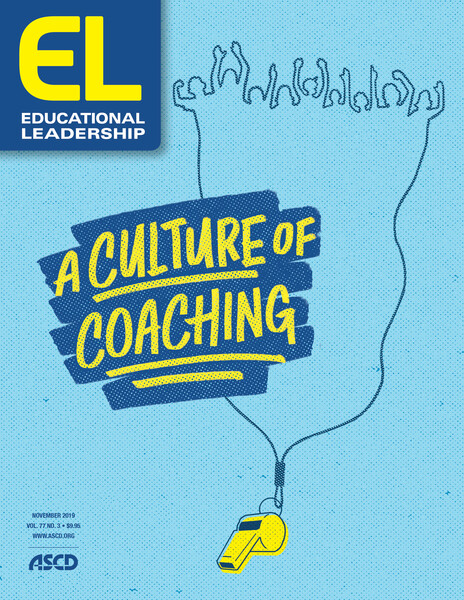As a building leader, you know you have pockets of greatness throughout your building. But how do you build collective expertise? How do you help your educators, both seasoned and veteran, learn from Mrs. Matthews about her effective classroom management techniques, or see how Mr. Hanley provides clarity for students who are driving their own learning? And how do you accomplish all this with a complex building schedule, limited professional development time, and no funding for an instructional coach?
Thanks to several current instructional movements, any school leader can give teachers valuable experiences observing and learning from colleagues to create a culture of coaching.
Open Observation and "Pineapple Visits"
Many schools are coming together by using the #observeme hashtag to encourage teachers to invite other teachers into their learning environments. These invited guests give the teacher feedback based on goals that teacher has identified for his or her teaching practice. Schools participating in this movement can encourage teachers to use social media platforms to advertise their desire for feedback using the #observeme hashtag. Alternatively, schools can create a sign that any teacher who wants to be observed places on their classroom door to invite their colleagues into the classroom. This sign asks observers to provide feedback based on the teacher's self-identified goals. It often contains a QR code linking to a Google Form for submitting that feedback. Feedback can also be given in simpler forms, such as written on a sticky note. (For more information and examples, search #observeme on social media platforms like Twitter and Facebook.)
The #observeme approach is great for ambitious teachers with a growth mindset or for a school with a well-established culture of coaching in which teachers are used to being observed and guided. But what about staff members who are nervous about identifying an area of growth and welcoming others into their classroom? How can you help all adult learners get comfortable being observed and informally "coached"? This is where #pineapplechart or #pineappleclassroom come into play (a pineapple being a traditional symbol of welcome).
With this movement, educators choose when to invite others into their learning environment by signing up on a chart the school creates, identifying a particular lesson they want to share and when they'll be delivering it. This chart can exist as a physical document, posted in the staff lounge, for instance, or in a digital format. Teachers also put an image of a pineapple on their classroom door during the time they're open for observation. The key is to make it easy for staff members to sign up, for hesitant teachers to have some control over when observers are and aren't expected, and for interested people to know when and where they can conduct an informal observation.
A Hybrid Approach
At Lake Zurich Middle School North in Illinois, where I was the assistant principal for five years and am now the chair of the science department, we built a coaching culture around a hybrid of these approaches. We give teachers the option to place a pineapple image on their door as a sign that they welcome fellow teachers into their classroom at any time or to sign up on a chart indicating their learning environment is open to colleagues for a specific lesson during a specific class period (see figure 1).
Figure 1. Welcome! This Week, Our Learning Environments Are Open …
Coaching Without Coaches - table
Monday | Tuesday | Wednesday | Thursday | Friday | |
|---|---|---|---|---|---|
| 1st | |||||
| 2nd | |||||
| 3rd | |||||
| 4th | |||||
| 5th | |||||
| 6th | |||||
| 7th | |||||
| 8th | |||||
| 9th | |||||
| 10th |
We also brainstormed a (continually developing) list of instructional strategies that staff members frequently use, which observers could look out for when they visited a classroom (such as inquiry-based learning, Socratic circles, stations or learning centers, student self-assessment, reciprocal teaching, and questioning techniques). The idea was to help staff members identify individual areas of pedagogical strength they could showcase to their peers. When an educator wants to share a particular strategy, they indicate on the chart the instructional strategy to be used on the particular day they're inviting colleagues into their classroom.
To help observers think about the learning and student engagement they saw during a visit, and how they might want to grow or change their practice as a result of that observation, we also created a reflection tool. The tool prompts observers to record "What I saw students doing," "What I heard," and "What I want to try in my own classroom or learn more about."
One challenge we faced was reducing barriers to teacher participation. We accomplished this by allowing grade-level teams the freedom to cancel team meetings to conduct pineapple visits. Teachers also had the leeway to conduct visits during their planning time.
After trying these two observation options for a full year, we've seen great results. Teachers who observed peers' classrooms have made comments like:
- "I want to go back again today and see more!"
- "I like the way [the teacher] brings energy into the classroom and refers to the goal throughout the lesson. I will try these strategies."
- "I love when a student shares out correctly, and the other students all give a unison clap of encouragement. In addition, "thermostat check" and "knock on the desk if you get it."
- "I liked the level of student self-direction in the classroom. I could incorporate more individually developed and driven work than I have."
A growing number of teachers chose to open up their classroom as the year progressed, demonstrating the faculty's interest in sharing their expertise with their colleagues.
The positive impact this peer coaching model made on teachers was also measured and documented in a survey-based evaluation of essential components for school success used statewide. The results showed an increase of 59 percent in the number of Lake Zurich Middle School teachers observing another teacher's classroom to offer feedback and an increase of 58 percent in the number of teachers observing another teacher's classroom to get ideas for their own instruction.
Offering "Unconferences"
A third approach to creating a culture of coaching is using the Edcamp or "unconference" model. An Edcamp is "participant-driven professional learning" where attendees "create discussion sessions based on the interests of the people in the room. There (is) no presenter; no boring slideshow." Building leaders can emulate this approach by allowing teachers to have voice and choice in their professional development. Start by identifying a time already set aside for professional development; a week before that event, ask teachers to submit ideas for a discussion they will lead. The focus can be as open or as narrow as they like; topics might include things like the school improvement plan, reading instruction, or strategies for educating ELLs. Next, identify how many people can be in each discussion and create a schedule for these discussions, allowing approximately 45 minutes for each. Share the schedule with participants, sit back, and watch the collaborative coaching unfold.
At Lake Zurich Middle School North, we have an unconference-style in-service for our educators every year. We do this for two-and-a-half-hours during an early-release day. Teacher-led discussions have included topics like social-emotional learning, mastery objectives, student self-reflection, and critical thinking skills. Feedback from these events has been overwhelmingly positive, including comments like:
- "Great collaboration between staff who don't typically get to share ideas."
- "I enjoy hearing other teachers discuss their professional practices. It is good for the culture of the building."
- "I loved having the option to choose my own learning!"
- "I enjoyed getting ideas from my colleagues. I work with exceptional teachers, but rarely get the opportunity to learn and share ideas with them. As professionals … we are always working to improve, and I enjoyed being given the professional trust to guide myself and not always be directed by those who don't know my needs."
What's Next?
So what's next in our journey to build a culture of coaching at Lake Zurich Middle School North? In the coming years, we plan to move towards a peer-to-peer observation model in which teachers identify a "pineapple partner" with whom they'll engage in an in-depth coaching cycle that includes targeted feedback based on an identified goal. We'll continue to hold an annual in-house unconference, allowing staff to exchange strategies and give and receive coaching based on their individual needs.
Sometimes the greatest source of professional development is the teacher down the hall.






